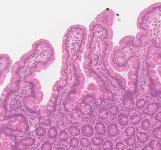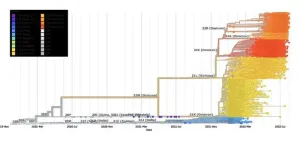(Press-News.org) Noted Maya archaeologist Julie Hoggarth, Ph.D., associate professor of anthropology at Baylor University, has been elected to the rank of AAAS Fellow, a lifetime honor announced today by the Council of the American Association for the Advancement of Science (AAAS), the world’s largest general scientific society and publisher of the Science family of journals.
Hoggarth is among the 471 scientists, engineers and innovators who have been elected 2024 Fellows for their scientifically and socially distinguished achievements throughout their careers. The new Fellow class hails from academic institutions, laboratories and observatories, hospitals and medical centers, museums, global corporations, nonprofit organizations, institutes and government agencies.
“This year’s class of Fellows are the embodiment of scientific excellence and service to our communities,” said Sudip S. Parikh, Ph.D., AAAS chief executive officer and executive publisher of the Science family of journals. “At a time when the future of the scientific enterprise in the U.S. and around the world is uncertain, their work demonstrates the value of sustained investment in science and engineering.”
This year’s AAAS Fellows class has moved their fields forward, paving the way for scientific advances that benefit society, bringing diverse and novelty thinking, innovative approaches and passion that will help solve the world’s most complex problems. As a 2024 AAAS Fellow, Hoggarth has been recognized for her “major research contributions that improved our understanding of the linkages among ancient demography, climate, environmental change, precise chronology and Maya history through meticulous archaeological research.” Hoggarth’s wide-ranging global research contributes to developing the long-term dynamics of climate change and the sociopolitical and demographic organization of ancient societies.
“This distinction means so much as a recognition of not only my own research but also the countless researchers, assistants, students, excavators and local communities that I work with and in which our archaeological research is based. Archaeology tends to be a collaborative effort, and I could not have accomplished the years of research, numerous publications and other professional achievements without the mentorship, friendship and collaboration of these individuals,” Hoggarth said. “I’m deeply grateful for these professional relationships and hope to offer the same support that the research community has given to me.”
Hoggarth is a Maya archaeologist specializing in the long-term dynamics of climate change and the sociopolitical and demographic organization of ancient societies. Her fieldwork is focused in western Belize, where she co-directs the Belize Valley Archaeological Reconnaissance (BVAR) Project. Her research has concentrated on building archaeological and historic datasets to assess how populations responded to drought, including high-precision radiocarbon chronologies assessing abandonment and demographic decline, as well as historical information on food availability and demographic trends. Her current research is focused on the sustainability of the ancient Maya, particularly in understanding household and polity-level decision-making for climate resilience.
Hoggarth’s research has been funded by the National Science Foundation, United Kingdom Research and Innovation, Wenner Gren Foundation, Archaeological Institute of America, National Endowment for the Humanities, Rust Family Foundation and Baylor University. She serves on the steering committee for the PAGES PEOPLE 3000 (PalEOclimate and the PeopLing of Earth) working group, which aims to integrate paleo-population, paleo-ecological and paleo-social records to investigate the co-evolutionary properties of socio-environmental systems.
“It is exciting that Dr. Hoggarth’s archaeological research on ancient Mayan societies in Central America is being recognized as a major scientific contribution by the AAAS,” said Lee Nordt, Ph.D., dean of the College of Arts & Sciences at Baylor.
The 2024 class joins the ranks of noted Fellows such as Alondra Nelson, the Harold F. Linder Professor at the Institute for Advanced Study, former deputy assistant to the President and acting director of the White House Office of Science and Technology Policy; Mae Jemison, the first Black woman to go to space; Steven Chu, 1997 Nobel laureate in physics who served as the 12th U.S. Secretary of Energy; Ellen Ochoa, veteran astronaut and the Johnson Space Center’s first Hispanic and second female director in its history; Grace Hopper, pioneer in computer software development and programming language; and Vint Cerf, who co-designed the TCP/IP protocols and the architecture of the Internet and received the U.S. Presidential Medal of Freedom.
The new Fellows will receive a certificate and a gold and blue rosette pin (representing science and engineering, respectively) to commemorate their election and will be celebrated this summer at a forum in Washington, D.C. The 2024 Fellows class also will be featured in the AAAS News & Notes section of the journal Science.
ABOUT BAYLOR UNIVERSITY
Baylor University is a private Christian University and a nationally ranked Research 1 institution. The University provides a vibrant campus community for more than 20,000 students by blending interdisciplinary research with an international reputation for educational excellence and a faculty commitment to teaching and scholarship. Chartered in 1845 by the Republic of Texas through the efforts of Baptist pioneers, Baylor is the oldest continually operating University in Texas. Located in Waco, Baylor welcomes students from all 50 states and more than 100 countries to study a broad range of degrees among its 12 nationally recognized academic divisions. Learn more about Baylor University at www.baylor.edu.
ABOUT THE COLLEGE OF ARTS & SCIENCES AT BAYLOR UNIVERSITY
The College of Arts & Sciences is Baylor University’s largest academic division, consisting of 25 academic departments in the sciences, humanities, fine arts and social sciences, as well as 11 academic centers and institutes. The more than 5,000 courses taught in the College span topics from art and theatre to religion, philosophy, sociology and the natural sciences. The College’s undergraduate Unified Core Curriculum, which routinely receives top grades in national assessments, emphasizes a liberal education characterized by critical thinking, communication, civic engagement and Christian commitment. Arts & Sciences faculty conduct research around the world, and research on the undergraduate and graduate level is prevalent throughout all disciplines. Visit the College of Arts & Sciences website.
ABOUT THE AMERICAN ASSOCIATION FOR THE ADVANCEMENT OF SCIENCE
The American Association for the Advancement of Science (AAAS)is the world’s largest general scientific society and publisher of the journal Science, as well as Science Translational Medicine; Science Signaling; a digital, open-access journal, Science Advances; Science Immunology; and Science Robotics. AAAS was founded in 1848 and includes more than 250 affiliated societies and academies of science, serving 10 million individuals. The nonprofit AAAS is open to all and fulfills its mission to “advance science and serve society” through initiatives in science policy, international programs, science education, public engagement, and more. For additional information about AAAS, visit www.aaas.org.
END
Baylor Anthropology scientist Julie Hoggarth, Ph.D., named AAAS Fellow
World’s largest general scientific society honors Associate Professor of Anthropology for meritorious contribution to the advancement of science
2025-03-27
ELSE PRESS RELEASES FROM THIS DATE:
Joint clinical commitment will advance integration of telehealth, value of patient care
2025-03-27
DALLAS, March 27, 2025 — Recent analysis by the National Health Institute indicates that telehealth now accounts for 23% of all health care encounters nationwide, with some clinical specialties reporting virtual visit rates now exceeding 50%.[1] To help ensure quality care in this rapidly expanding field, the American Heart Association Center for Telehealth and the National Institutes of Health-funded University of North Carolina Chapel Hill Center for Virtual Care Value and Excellence (UNC-Chapel Hill ViVE), are building ...
The Protein Society announces its 2025 Award Recipients
2025-03-27
FOR IMMEDIATE RELEASE
Contact:
Raluca Cadar
The Protein Society
Phone: (844) 377-6834
E-mail: rcadar@proteinsociety.org
LOS ANGELES, CA – The Protein Society, the premier international society dedicated to supporting protein research, announces the winners of the 2025 Protein Society Awards, which will be recognized at the 39th Annual Symposium, June 26 – 29, 2025, in San Francisco, USA. Plenary talks from award recipients will take place throughout the 3.5-day event. The winners’ scientific accomplishments, described by their nominators below, demonstrate their profound impact on protein science.
The Christian B. Anfinsen ...
AI is as good as pathologists at diagnosing celiac disease, study finds
2025-03-27
A machine learning algorithm developed by Cambridge scientists was able to correctly identify in 97 cases out of 100 whether or not an individual had coeliac disease based on their biopsy, new research has shown.
The AI tool, which has been trained on almost 3,400 scanned biopsies from four NHS hospitals, could speed up diagnosis of the condition and take pressure off stretched healthcare resources, as well as improving diagnosis in developing nations, where shortages of pathologists are severe.
Digital ...
AI could help sonographers identify abnormalities in unborn babies more quickly
2025-03-27
Artificial intelligence (AI) could help sonographers identify any abnormalities at the 20-week pregnancy screening scan almost twice as quickly, without reducing the accuracy or reliability of diagnoses, a new study has shown.
This will help improve patient care by allowing sonographers to focus on other aspects of the scan, such as communicating with parents or spending more time looking at any areas of concern.
The trial is the first of its kind to use AI for the 20-week pregnancy scan on real patients, and is ...
First clinical trial of an AI therapy chatbot yields significant mental health benefits
2025-03-27
Dartmouth researchers conducted the first clinical trial of a therapy chatbot powered by generative AI and found that the software resulted in significant improvements in participants' symptoms, according to results published March 27 in the New England Journal of Medicine AI.
People in the study also reported they could trust and communicate with the system, known as Therabot, to a degree that is comparable to working with a mental-health professional.
The trial consisted of 106 people from across the United States diagnosed with major depressive disorder, generalized anxiety disorder, or an eating disorder. ...
AI learns to ‘speak’ genetic ‘dialect’ for future SARS-CoV-2 mutation prediction
2025-03-27
It’s been five years since COVID-19 was declared a global pandemic. As SARS-CoV-2 shifts to endemic status, questions about its future evolution remain. New variants of the virus will likely emerge, driven by positive selection for traits such as increased transmissibility, longer infection duration and the ability to evade immune defenses. These changes could allow the virus to spread among previously immunized populations, potentially triggering new waves of infection.
Predicting new mutations in viruses is crucial for advancing life science research, particularly when trying to understand how viruses evolve, ...
$50 million gift from the Weill Family Foundation establishes the Weill Cancer Hub East
2025-03-27
New York, N.Y., and Princeton, N.J. (March 27, 2025)—With a mission to understand how nutrition and metabolism impact the body’s ability to control cancer, four leading research institutions have united under the Weill Cancer Hub East, an innovative, collaborative partnership that aims to transform cancer treatment. The initiative connects world-class experts from Princeton University, The Rockefeller University, Weill Cornell Medicine and the Ludwig Institute for Cancer Research to enhance a ...
Physics meets art: a new twist on interference patterns
2025-03-27
Tokyo, Japan – One of the simplest and most beautiful naturally occurring patterns can be observed when light is shined through a pair of slightly misaligned periodic structures. This phenomenon, known as the moiré effect, is not only pretty to look at, but also has important consequences for the properties of materials.
In an article published in ACS Nano, a team led by researchers from the Institute of Industrial Science, The University of Tokyo, announced the discovery of a previously unseen moiré pattern: a series of periodic one-dimensional bands in tungsten ditelluride bilayers.
In nanomaterials, moiré patterns ...
Elevating global heart failure care with new certification
2025-03-27
DALLAS, March 27, 2025 — More than 56 million people globally live with heart failure (HF), which prevents the body from getting enough of the oxygen-rich blood it needs to work properly.[1]
While there is no cure for HF, many people with this condition can live full, enjoyable lives and disease progression can be slowed with the right treatment. Research shows that outcomes for patients with HF improve when health care professionals and hospitals provide guideline-directed medical therapies.
A new Heart Failure Center ...
The MIT Press releases 2025 Direct to Open (D2O) Impact Report
2025-03-27
The MIT Press is proud to release our 2025 Impact Report for Direct to Open (D2O), our sustainable framework for open access monographs that shifts publishing from a solely market-based purchase model where individuals and libraries buy single eBooks, to a collaborative, library-supported open access model.
The continued growth in the reach of open access publishing couldn’t be more timely. In 2025, access to truth and facts are under attack, and democratizing access to trustworthy, peer-reviewed information has never been more important. In the face of so many forces working against the spread of knowledge, Direct to Open continues to be a critical tool.
To date, ...
LAST 30 PRESS RELEASES:
How stepping into nature affects the brain
Study: Cancer’s clues in the bloodstream reveal the role androgen receptor alterations play in metastatic prostate cancer
FAU Harbor Branch awarded $900,000 for Gulf of America sea-level research
Terminal ileum intubation and biopsy in routine colonoscopy practice
Researchers find important clue to healthy heartbeats
Characteristic genomic and clinicopathologic landscape of DNA polymerase epsilon mutant colorectal adenocarcinomas
Start school later, sleep longer, learn better
Many nations underestimate greenhouse emissions from wastewater systems, but the lapse is fixable
The Lancet: New weight loss pill leads to greater blood sugar control and weight loss for people with diabetes than current oral GLP-1, phase 3 trial finds
Pediatric investigation study highlights two-way association between teen fitness and confidence
Researchers develop cognitive tool kit enabling early Alzheimer's detection in Mandarin Chinese
New book captures hidden toll of immigration enforcement on families
New record: Laser cuts bone deeper than before
Heart attack deaths rose between 2011 and 2022 among adults younger than age 55
Will melting glaciers slow climate change? A prevailing theory is on shaky ground
New treatment may dramatically improve survival for those with deadly brain cancer
Here we grow: chondrocytes’ behavior reveals novel targets for bone growth disorders
Leaping puddles create new rules for water physics
Scientists identify key protein that stops malaria parasite growth
Wildfire smoke linked to rise in violent assaults, new 11-year study finds
New technology could use sunlight to break down ‘forever chemicals’
Green hydrogen without forever chemicals and iridium
Billion-DKK grant for research in green transformation of the built environment
For solar power to truly provide affordable energy access, we need to deploy it better
Middle-aged men are most vulnerable to faster aging due to ‘forever chemicals’
Starving cancer: Nutrient deprivation effects on synovial sarcoma
Speaking from the heart: Study identifies key concerns of parenting with an early-onset cardiovascular condition
From the Late Bronze Age to today - Old Irish Goat carries 3,000 years of Irish history
Emerging class of antibiotics to tackle global tuberculosis crisis
Researchers create distortion-resistant energy materials to improve lithium-ion batteries
[Press-News.org] Baylor Anthropology scientist Julie Hoggarth, Ph.D., named AAAS FellowWorld’s largest general scientific society honors Associate Professor of Anthropology for meritorious contribution to the advancement of science





